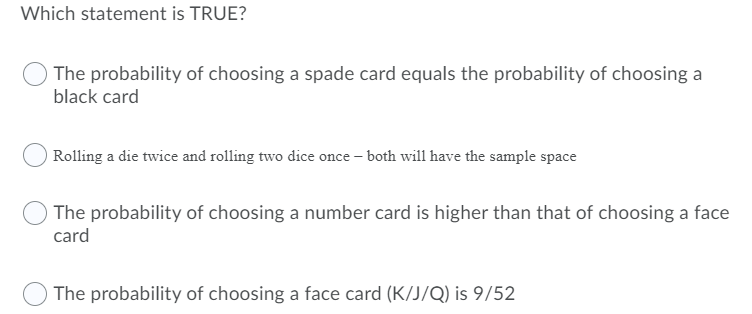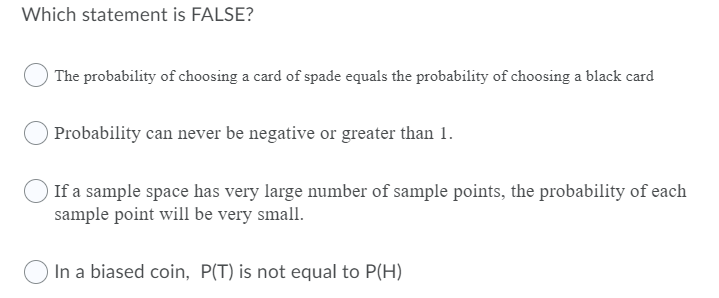Which statement is TRUE? The probability of choosing a spade card equals the probability of choosing a black card Rolling a die twice and rolling two dice once – both will have the sample space The probability of choosing a number card is higher than that of choosing a face card The probability of choosing a face card (K/J/Q) is 9/52
Which statement is TRUE? The probability of choosing a spade card equals the probability of choosing a black card Rolling a die twice and rolling two dice once – both will have the sample space The probability of choosing a number card is higher than that of choosing a face card The probability of choosing a face card (K/J/Q) is 9/52
College Algebra
7th Edition
ISBN:9781305115545
Author:James Stewart, Lothar Redlin, Saleem Watson
Publisher:James Stewart, Lothar Redlin, Saleem Watson
Chapter9: Counting And Probability
Section9.3: Binomial Probability
Problem 2E: If a binomial experiment has probability p success, then the probability of failure is...
Related questions
Question

Transcribed Image Text:Which statement is TRUE?
The probability of choosing a spade card equals the probability of choosing a
black card
Rolling a die twice and rolling two dice once – both will have the sample space
The probability of choosing a number card is higher than that of choosing a face
card
The probability of choosing a face card (K/J/Q) is 9/52

Transcribed Image Text:Which statement is FALSE?
The probability of choosing a card of spade equals the probability of choosing a black card
Probability can never be negative or greater than 1.
If a sample space has very large number of sample points, the probability of each
sample point will be very small.
In a biased coin, P(T) is not equal to P(H)
Expert Solution
This question has been solved!
Explore an expertly crafted, step-by-step solution for a thorough understanding of key concepts.
Step by step
Solved in 2 steps

Knowledge Booster
Learn more about
Need a deep-dive on the concept behind this application? Look no further. Learn more about this topic, probability and related others by exploring similar questions and additional content below.Recommended textbooks for you

College Algebra
Algebra
ISBN:
9781305115545
Author:
James Stewart, Lothar Redlin, Saleem Watson
Publisher:
Cengage Learning


College Algebra
Algebra
ISBN:
9781305115545
Author:
James Stewart, Lothar Redlin, Saleem Watson
Publisher:
Cengage Learning
